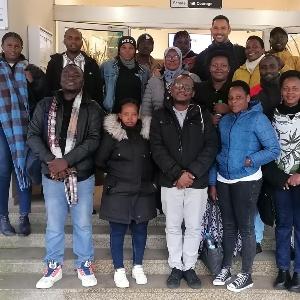Educational science students from Tanzania visit LMU
From Tanzania to Munich: an exchange project to promote inclusive education and intercultural understanding

From Tanzania to Munich: an exchange project to promote inclusive education and intercultural understanding

The Chair for Behavioral Disorders and Autism at LMU's Department of Educational Sciences and Rehabilitation has been collaborating with the Open University of Tanzania (OUT) since 2019. So far, this partnership has enabled 30 LMU students from various teaching degree programs to participate in internships, research projects and study visits in Tanzania.
In order to deepen this collaboration and enable students from OUT to visit LMU, an Erasmus+ project was approved in 2023. The International Office supported the Chair with administrative activities ranging from support for the project application and the preparation of necessary documents to the procurement of affordable flights for the visitors.
The Tanzanian delegation arrived in Munich on October 10, 2024 and stayed until December 8, 2024 - a two-month stay with a jam-packed program in a context that was completely new to the students. The study visit aimed to give them practical insights into the German education system and to familiarize them with innovative pedagogical approaches for marginalized groups, including children with disabilities.
The students completed internships at three different schools: the Sonderpädagogisches Förderzentrum (SfZ) Freiham, the Grund- und Mittelschule Lochham and the Grundschule Am Hardernfeld. They observed classroom activities and applied inclusive teaching practices, and exchanged views with German teachers on different approaches to inclusion. They also visited the Sternfee Kindergarten and the Förderschule Wichern-Zentrum in Munich, which uses individualized and tailored methods to support children with behavioral disorders in their academic and social development.
The guests also had the opportunity to discuss reflection sheets used at LMU with Dr. Clemens Schlegel from the Internship Office of the MZL (Münchener Zentrum für Lehrerbildung). These tools for promoting critical self-reflection and career development were made available to all participants in a version translated into Kiswahili.
In addtion, the program included a series of events dealing with key aspects of inclusive education and intercultural understanding. These events provided valuable insights and fostered meaningful dialog on topics such as hospital pedagogy and intercultural communication. Hence, the participants analyzed and discussed the role of community in education and its impact on inclusive learning environments, educational support for children during hospitalization and pedagogical strategies to address the diverse needs of learners in multicultural and inclusive settings. They were also encouraged to reflect on the practical application of concepts to their own educational and cultural contexts and to critically analyze German and Tanzanian approaches to the implementation of the UN Convention on the Rights of Persons with Disabilities.
An important element of the project was, of course, the promotion of intercultural understanding and communication amongst the participants. Cultural actvities included a welcome dinner introducing the guests to German hospitality, a visit to Munich's Olympic Park, the Allianz Arena, Lake Starnberg and Lake Schliersee, as well as an excursion to the University of Würzburg. The students also visited the Museum Fünf Kontinente and the screening of the movie Das leere Grab ("The Empty Tomb"). These activities gave them the opportunity to reflect on the historical relationship between Germany and Tanzania and to explore topics such as colonialism and cultural identity.
The project was very inspiring for both the visitors and the hosts. The Tanzanian students gained practical experience in the field of inclusive education, for example by learning about individualized teaching methods and the advantages of smaller classes. They also had the opportunity to reflect on the applicability of German practices to their own educational contexts. Furthermore, the exchange promoted mutual understanding of social norms and educational practices in Germany and Tanzania. All project participants are very much looking forward to continuing this lively and enriching partnership between LMU and the Open University of Tanzania.
Further information on LMU's Chair for Behavioral Disorders and Autism